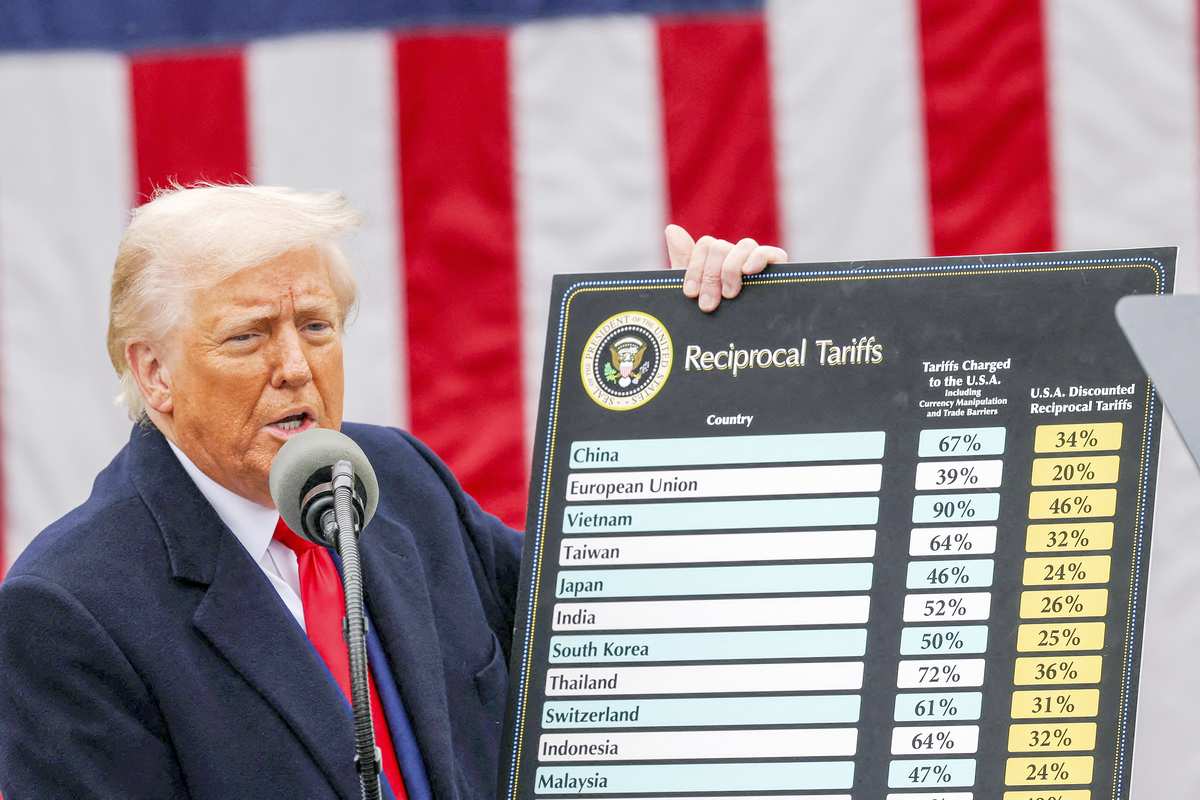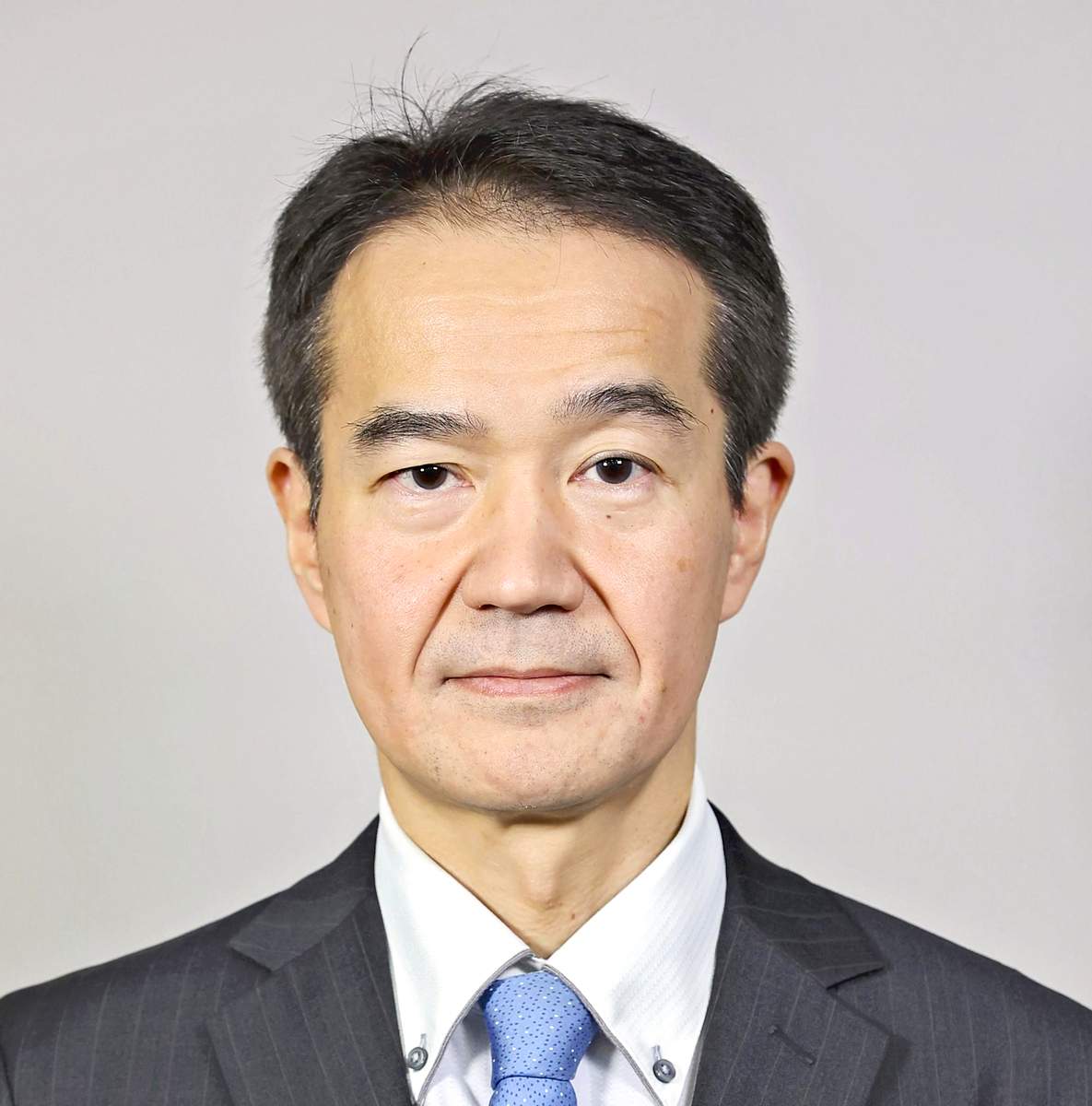Ishiba Should Let Bureaucrats Help Deal with Trump; President is Unpredictable; Diplomacy Not PM’s Forte

U.S. President Donald Trump delivers remarks on tariffs in the Rose Garden at the White House in Washington on April 2.
8:00 JST, April 19, 2025
U.S. President Donald Trump’s tariffs have caused chaos around the world. Japan, an ally of the United States, is among the countries to be greatly shocked by them.
The tariff rate on Japan is 24%. “We never thought such a high tariff rate would be imposed,” said a senior Japanese government official. On April 9, Trump announced a 90-day suspension of this “reciprocal” tariff, while leaving a 10% “baseline” tariff in place. A 25% tariff on automobiles also remains. Automobiles are Japan’s top export to the United States, so the impact of the tariff measures remains enormous for this country.
When Prime Minister Shigeru Ishiba met with Trump on a visit to the United States in February, the meeting was evaluated in Japan as a success to a certain extent because the U.S. side did not ask for an increase in defense spending. Since stabilizing the relationship with the unpredictable Trump is directly linked to Japan’s national interests, optimism began to spread about Japan-U.S. relations under the Trump administration.
However, the imposition of the new tariffs is something that Ishiba himself has called a “national crisis,” and the optimism has disappeared all at once. Even if Ishiba had built a personal relationship with Trump, he could not have prevented the imposition of the tariffs. In an April 2 speech, Trump even criticized Japan by name, saying, “Perhaps worst of all are the nonmonetary restrictions imposed by South Korea, Japan and very many other nations.”
I covered the first Trump administration as a Yomiuri Shimbun correspondent in Washington. At that time, Japanese and American government officials alike often said, “Trump remembers what he was told the moment before.” If someone explains to Trump that “Japan is the world’s largest investor in the United States,” he will agree for a moment, but if someone then tells him, “American cars don’t sell in Japan because of non-tariff barriers,” he will immediately switch to being critical of Japan.
That is why it is essential to constantly meet with Trump and re-explain Japan’s position, a practice that had become the basis of Japan’s policy toward the United States. However, Ishiba has not been able to build a close relationship with Trump, in contrast to former Prime Minister Shinzo Abe, who kept in close contact with Trump during his first term.
Everyone has their strengths and weaknesses, but it cannot be said that Ishiba is good at diplomacy. Looking back at his career as a politician, Ishiba has been involved in security issues as defense minister, but he has little experience in diplomacy. His failure to make eye contact with Trump at their summit in February and his awkward demeanor at his meeting with Chinese President Xi Jinping in November last year make it clear that diplomacy is not his forte. However, as prime minister, he must work to protect Japan’s national interests, regardless of his strengths and weaknesses.
There are two favorable factors for Japan in the uncertain future of the negotiations with the United States. One is that Treasury Secretary Scott Bessent, who is in charge of the negotiations on the U.S. side, is well-versed on Japan and is thought to understand the situation surrounding Japan. It is expected that Bessent will calmly analyze the current Japan-U.S. relationship and find a landing point for the negotiations with Japan, without, like Trump, being swayed by an image of Japan that was formed decades ago. (Of course, just because he is well-versed on Japan does not mean that Bessent will soften his stance toward Japan in the negotiations.)
The other favorable factor is that, although the Japanese government is led by Ishiba, who has little diplomatic experience, the bureaucrats in Kasumigaseki, particularly in the Foreign Ministry, have analyzed Trump’s thinking in detail and have supported Japan’s foreign policy in a consistent way. In the presidential system of the United States, personnel in the key posts in government agencies that handle practical matters are replaced every time there is a change of administration, but in Japan, bureaucrats continue to support policies no matter who becomes prime minister, even if there is a change of administration.
Politics led by bureaucrats has its drawbacks and always attracts criticism. But when confronting an unpredictable American president like Trump, it is necessary to have built a thorough understanding of him from his first term onward, so as to carefully and shrewdly consider what measures should be taken, rather than pursuing simple diplomacy that only uses ad hoc ideas and logically right but rigid arguments.
Fortunately, National Security Advisor Masataka Okano, who supports the foreign and security policies of the Ishiba administration in his role at the National Security Secretariat, served as a political envoy at the Japanese Embassy in the United States during the first Trump administration and has built relationships with members of the current Trump administration. Ishiba emphasized that “we will tackle [the negotiations on the tariff issue] with a whole-of-government approach,” and that he is prepared to use all of Japan’s strength to deal with Trump. The prime minister must recognize his own lack of experience in diplomacy, listen carefully to the voices of those around him, and demonstrate his own leadership.
Political Pulse appears every Saturday.

Seima Oki
Seima Oki is a deputy editor in the Political News Department of The Yomiuri Shimbun.
Top Articles in Editorial & Columns
-

Riku-Ryu Pair Wins Gold Medal: Their Strong Bond Leads to Major Comeback Victory
-

40 Million Foreign Visitors to Japan: Urgent Measures Should Be Implemented to Tackle Overtourism
-

China Provoked Takaichi into Risky Move of Dissolving House of Representatives, But It’s a Gamble She Just Might Win
-

University of Tokyo Professor Arrested: Serious Lack of Ethical Sense, Failure of Institutional Governance
-

Policy Measures on Foreign Nationals: How Should Stricter Regulations and Coexistence Be Balanced?
JN ACCESS RANKING
-

Japan PM Takaichi’s Cabinet Resigns en Masse
-

Japan Institute to Use Domestic Commercial Optical Lattice Clock to Set Japan Standard Time
-

Israeli Ambassador to Japan Speaks about Japan’s Role in the Reconstruction of Gaza
-

Man Infected with Measles Reportedly Dined at Restaurant in Tokyo Station
-

Videos Plagiarized, Reposted with False Subtitles Claiming ‘Ryukyu Belongs to China’; Anti-China False Information Also Posted in Japan






















